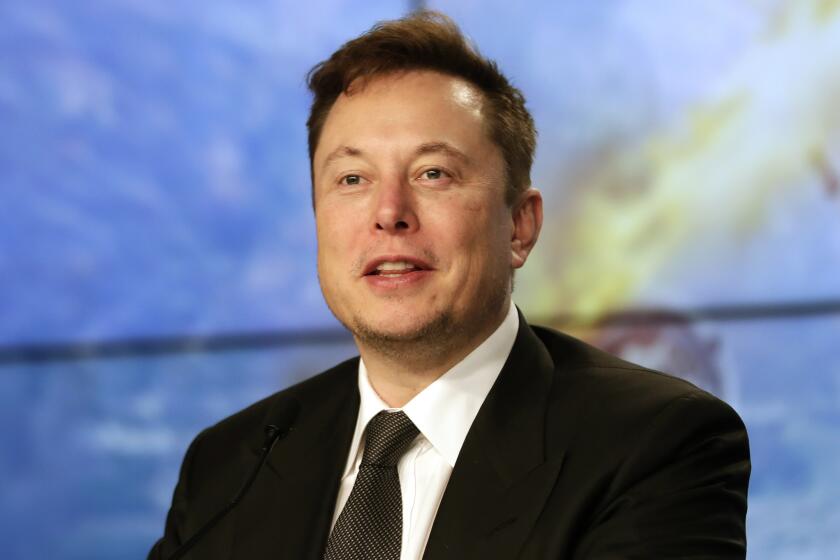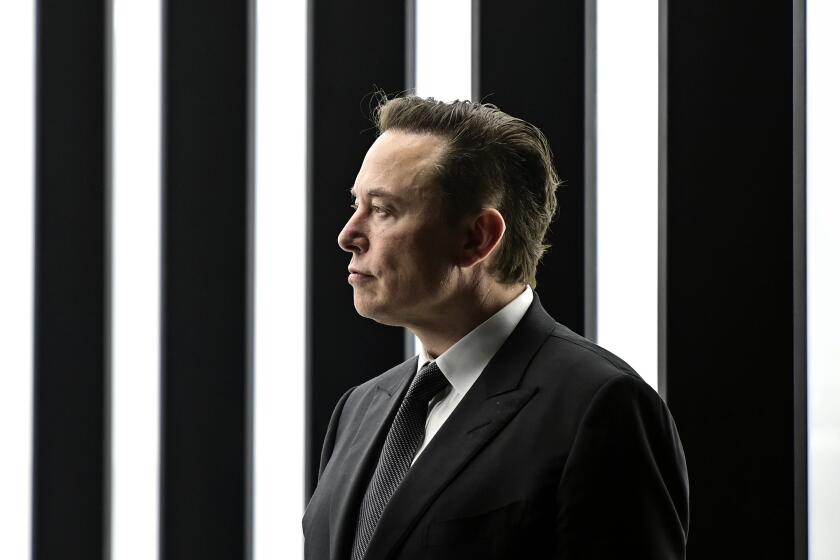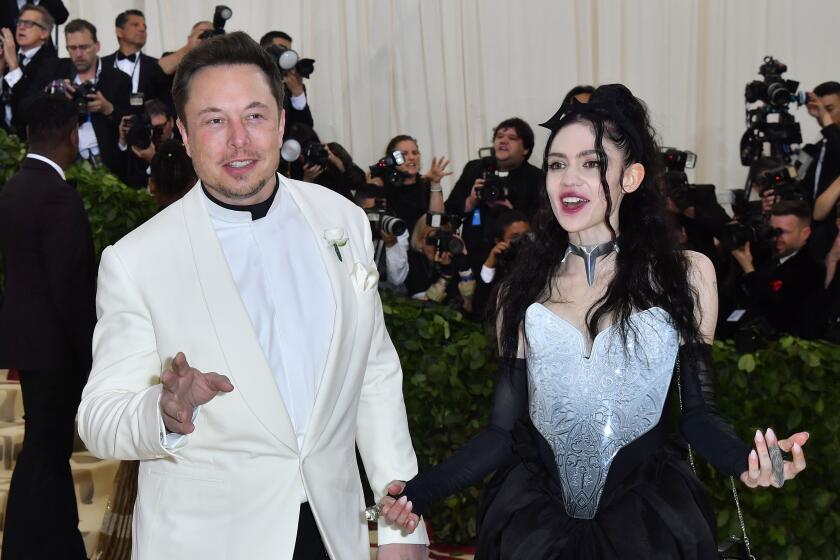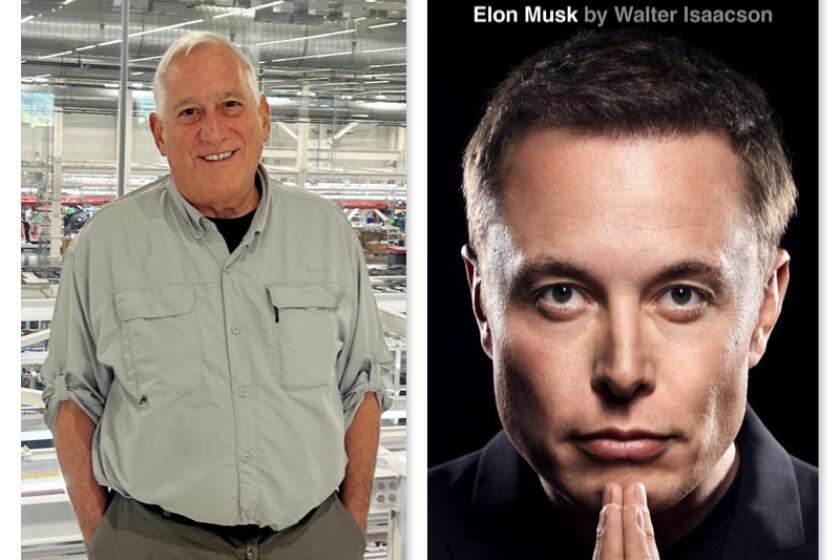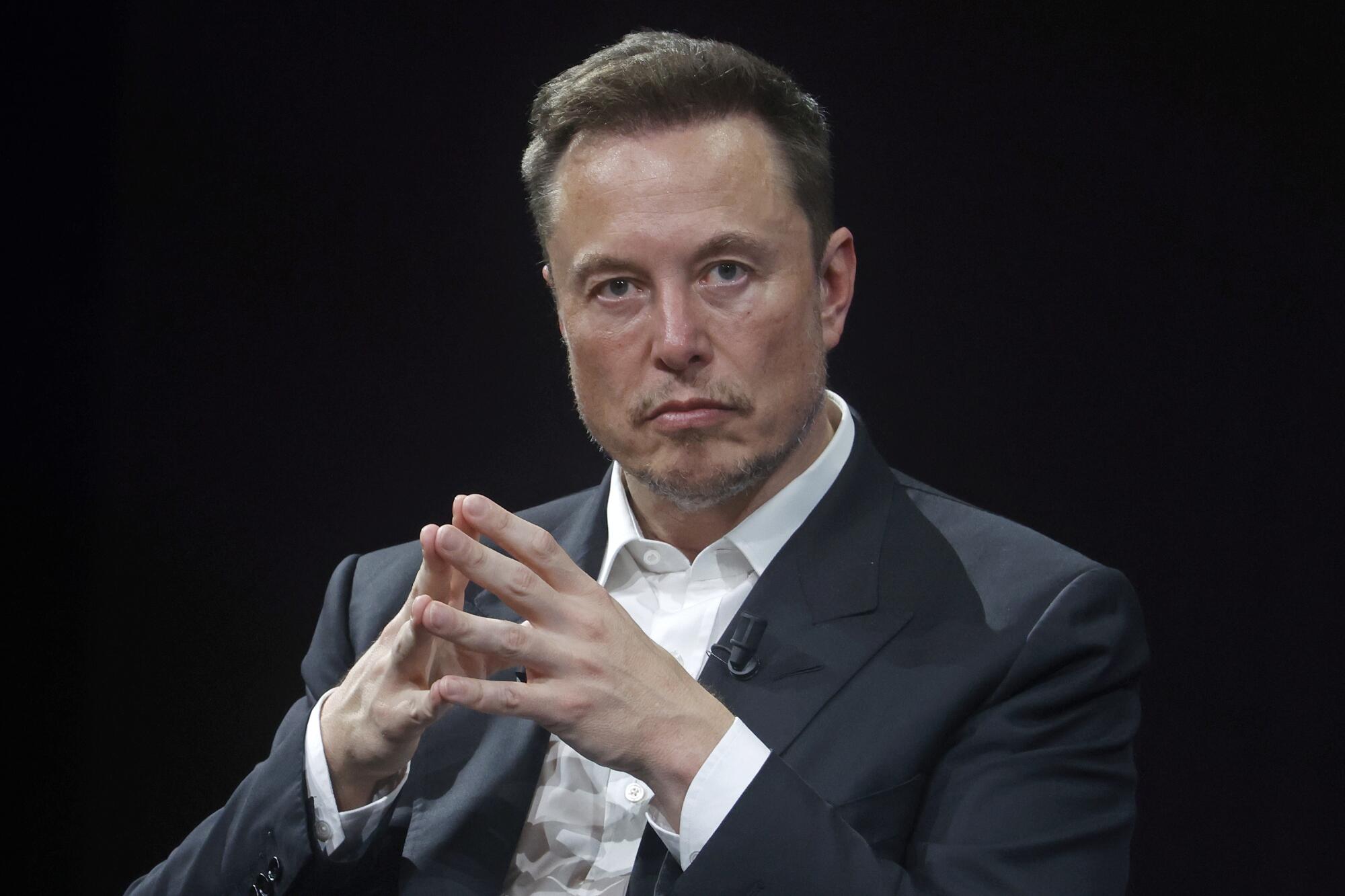
- Share via
Review
Elon Musk
By Walter Isaacon
Simon & Schuster: 688 pages, $35
If you buy books linked on our site, The Times may earn a commission from Bookshop.org, whose fees support independent bookstores.
The opening pages of “Elon Musk,” the new doorstop biography from Walter Isaacson, the bestselling chronicler of the great innovative men of modern history, are jarring, especially to anyone expecting to be greeted with plucky tales of unlikely genius.
On the first page, we’re told that Musk, the CEO of Tesla and SpaceX, owner of X (formerly Twitter), and currently the world’s richest man, was born into a land of incredible violence in South Africa, “with machine gun attacks and knife killings common,” where boys have to “wade through pools of blood” on the way to concerts and are sent to wilderness camps that resemble “a paramilitary Lord of the Flies,” per Musk. Young Elon is bullied relentlessly — by his classmates but also by his abusive father — until he grows big enough to fight back.
Introducing the 688-page biography this way seems designed to address Musk’s recent turn toward combativeness and cruelty — if not justifying it, then offering a skeleton key to understanding where it’s rooted. But as we learn throughout the book, the Musks are persistent fabulists, prone to embellishment and fabrication, and this becomes the first of many narrative sequences that the reader must consider with an eye to truth versus narrative convenience.
Walter Isaacson’s biography of Elon Musk distilled, from fierce mood swings and Ukraine intervention to his ‘dumb’ Pelosi tweet and that time he had the 405 repainted.
And Isaacson’s truth is, above all, selective. Given Musk’s recent coziness with white nationalists and peddlers of junk race science and his ongoing tirade against the Anti-Defamation League, whom he blames (rather than himself) for chasing advertisers from Twitter, it seems startling that nothing in those opening pages touches on his experiences with apartheid. Much of that horrendous violence unfolding in 1980s South Africa was precipitated by a brutally racist government; we discover only that it taught Musk to survive adversity. “My pain threshold is very high,” he tells Isaacson.
We do learn that Musk’s Canadian grandfather was involved in a fringe political party with antisemitic views and relocated his family to South Africa because he liked the government better — he is described as harboring “quirky conservative views” — and that Musk’s father is now outspokenly racist. But in a book that goes to great lengths to dissect the transmission of habits and ideas from father and son, Elon is allowed to stay mum.
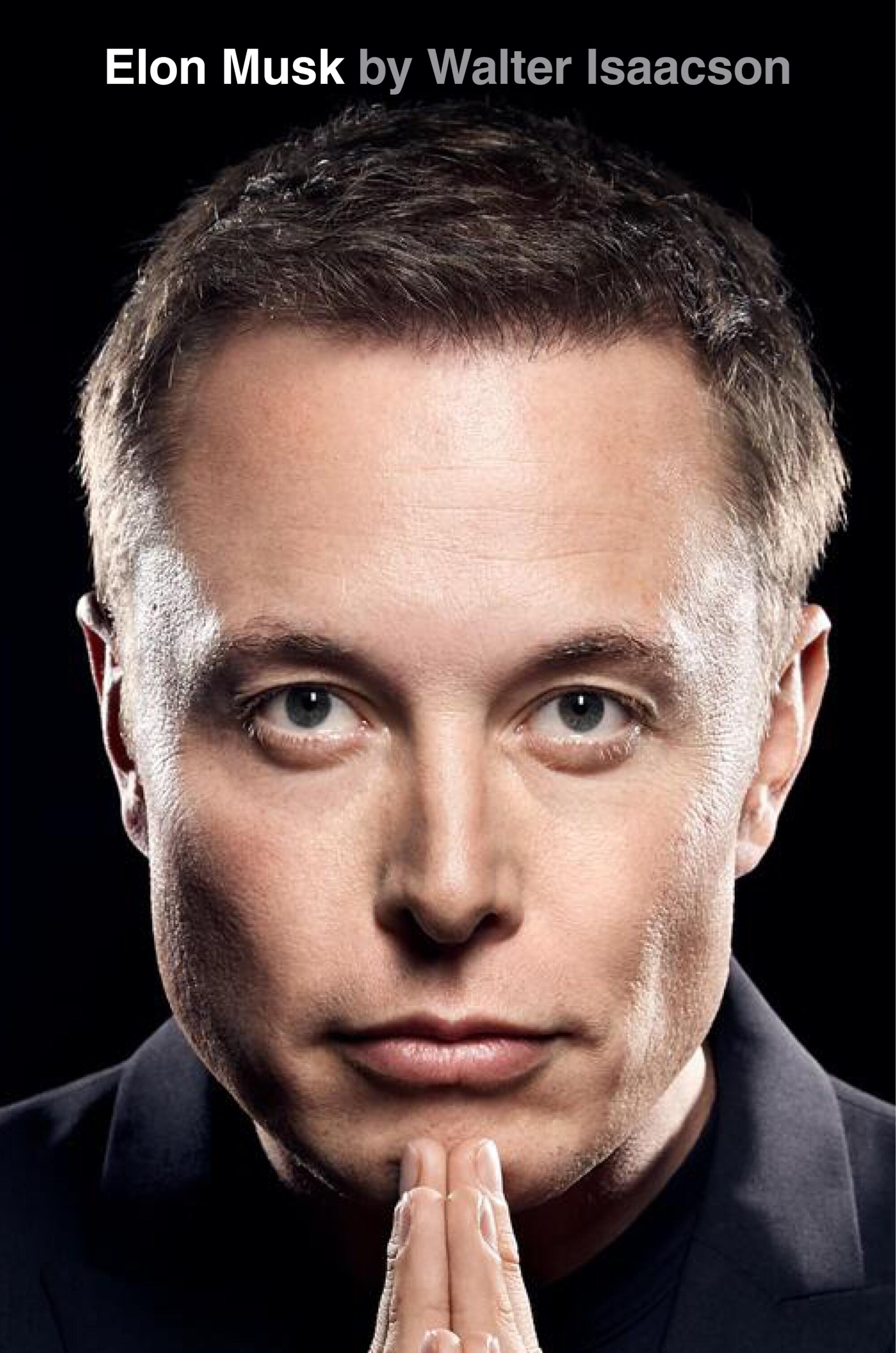
Silences like that come to haunt the capacious hull of “Elon Musk” — to the point that they risk drowning out the project altogether.
After the burst of violence in the introduction, we move into more familiar territory, led on by Isaacson’s brisk, propulsive prose: Musk is a spacy, lonely outsider who is bright but has trouble making friends. He disappears into video games and science fiction and soon dreams of horizons far beyond his hometown, and sets out to North America with an entrepreneurial spirit in tow. He graduates with a dual degree in physics and economics from the University of Pennsylvania, gets accepted into a PhD program at Stanford, but decides instead to set out into the buzzing startup scene of Silicon Valley.
He founds Zip2 with his brother Kimbal, sells it, and makes a lot of money. He founds the first iteration of X.com, merges with PayPal, and makes even more. Initially the CEO of both companies, he’s pushed out of each — in a bit of foreshadowing, Musk is booted from PayPal because of his monomaniacal dedication to the porn-adjacent letter X, as well as the idea that PayPal should try to “take over the world’s financial system.” His dismissal, brought about in a coup led by Peter Thiel and other members of the so-called PayPal mafia, leaves him with a large pool of cash, an ax or two to grind and an aspiration to take on loftier goals.
In his ‘Elon Musk’ biography, Walter Isaacson examines the billionaire’s political evolution, from fundraising for Democrats to trolling progressive politicians.
Here the limitations of Isaacson’s project are revealed: Musk had pushed some of the worst ideas of his young career. From a business perspective, it seemed his colleagues were correct to oust him, preserve their product and make them all fabulously wealthy in an IPO and later sale to EBay. But here’s Isaacson’s diagnosis: “He was a visionary who didn’t play well with others.” The word “visionary,” in this application, is doing a lot of work.
The narrative is filled with moments of similar dissonance, with Isaacson quick to praise Musk’s incessant risk-taking after a disaster, or to excuse his rude behavior to underlings as necessary to get things done, or to nod along in prose while Musk announces his latest idea that will transform the world. He does occasionally push back, as when Musk claims the Hyperloop will change everything (“It did not change everything”), but Isaacson mostly accepts Musk’s confident prognostications as gospel.
Isaacson — biographer of Steve Jobs, Albert Einstein, Henry Kissinger, Benjamin Franklin — is concerned with the study of world-moving men (and occasionally a woman). What makes innovators tick? What makes them so successful? (In the case of Musk, the prognosis can be summarized as: a large appetite for risk, a willingness to alienate colleagues, a detailed knowledge of industry and science, an ability to process work tasks like an algorithm and a predilection for drawing lessons from video games and “The Hitchhiker’s Guide to the Galaxy.”)
Elon Musk and Grimes have a third child named Techno Mechanicus, the tech mogul confirmed ahead of the release of Walter Isaacson’s forthcoming biography.
This sort of framing may have made sense in the early aughts, when so many were dizzy with optimism that Amazon’s everything store and the iPhone would transform the world for the better. It makes less sense 12 years after “Steve Jobs” — now that we’ve seen the toll the tech giants have levied on society: labor exploitation at Amazon, Uber and, yes, Tesla; misinformation and harassment on social media platforms like Facebook, Instagram and, yes, Twitter. These costs are almost entirely omitted from the equation of “Elon Musk.”
That may be because there is a tacit pact between author and subject in the Isaacson “great man” biography: The author will unearth unflattering personal anecdotes and share stories about the subject’s capacity to be cruel. In exchange, the subject’s greatness will be treated as an assumption, the raison d’etre for the book itself. In honor of Isaacson’s habit of using pithy, memorable phrases to describe a phenomenon, we might call it “the Isaacson Accord.”
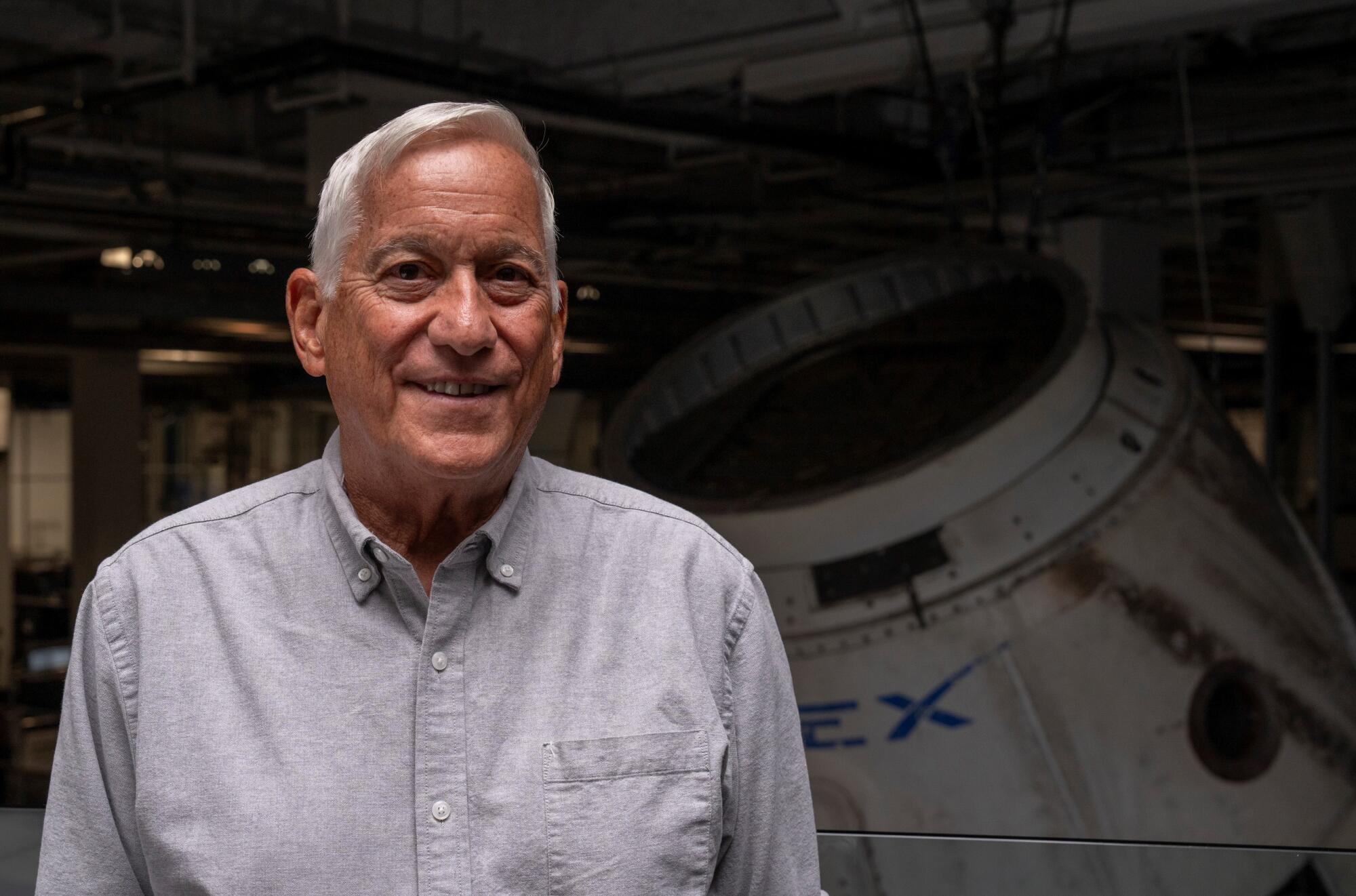
And so it is in “Elon Musk,” whose subject is described as “a visionary” and a “risk-taking innovator” and, most pointedly, “the one launching us toward Mars and an electric-vehicle future.” Musk’s many fans will surely take those descriptors as a given. But that seems all the more reason to challenge the assumptions. Because the Isaacson Accord turns out to be a devil’s bargain. We get a lot of palace intrigue, well-told anecdotes and some genuine insight into Musk’s familial psychology; but the good stuff almost comes in spite of Isaacson’s constant framing of Musk as a moody but brilliant world-mover.
Worse, in exchange for unprecedented access, the Isaacson Accord demands that a lot of the most difficult and pressing questions go unasked and, therefore, unanswered.
Isaacson repeatedly says one of Musk’s unparalleled strengths as a manager is his intimate knowledge of the factory floors where his products are made. Yet there is not a single mention of the sweeping allegations of racial discrimination at Tesla’s flagship Fremont factory that resulted in juries finding Tesla liable for millions in damages. Workers of color say they were called the N-word and saw swastikas painted on the bathroom. In 2021, Tesla was ordered to pay $137 million to one employee who suffered racist abuse, though that amount was later reduced.
L.A. Times Book Club lineup features Elon Musk biographer Walter Isaacson and Christian Cooper, author of ‘Better Living Through Birds.”
Likewise, there is no examination of the union drives at Tesla plants, or the wrongful termination case Tesla lost after firing a worker involved in organizing. In all the discussion of Tesla’s self-driving Autopilot program, there is no mention of the blockbuster revelation from a former engineer that one of the first key promotions of Autopilot was staged, contributing to the false sense of security buyers had in the program.
And while a major focus of the book is the impact of Musk’s abusive father and the traits that might have been passed down, Isaacson speeds past any explanation of the falling out with Musk’s trans daughter, Jenna, allowing Musk to file it away as her political views simply having grown too radical. Isaacson does not list her as a source in the book, as her twin brother, and does not say whether he tried to reach out. Musk’s story, about Jenna having succumbed to the “woke mind virus,” stands.
No biography can or should be totally comprehensive, but it’s pretty easy to conclude which sorts of topics and conversations Isaacson decided it would be best to avoid altogether. I started “Elon Musk” wondering if the world needed another book positioning Musk as a great man — Ashlee Vance’s book of the same title ably covered many of the same bases — and finished thinking it’s time to retire the entire genre of “great innovator” biographies, period.
The idea that the future is created by flawed geniuses who happen to accumulate great wealth is outmoded and simplistic, and it encourages a flattened view of how technology is developed and whom it impacts. Just scan the list of sources Isaacson includes in the book: executives, venture capitalists, founders and high-ranking engineers. Yes, Isaacson spoke to “adversaries” like Jeff Bezos and Bill Gates, but not (at least per the list) to line workers, not to Jenna, not to anyone whose family member died in an Autopilot crash, nor anyone who tried to organize a Tesla plant.
The bottom line: This is the story Musk himself wants told. Sure, he might have excluded a handful of the details that proved personally embarrassing, but nothing here challenges the idea that Elon Musk is an all-too-human hero valiantly trying to save humanity from the threats he sees cascading down upon us. It’s the book Musk would have written himself.
More to Read
Sign up for our Book Club newsletter
Get the latest news, events and more from the Los Angeles Times Book Club, and help us get L.A. reading and talking.
You may occasionally receive promotional content from the Los Angeles Times.
